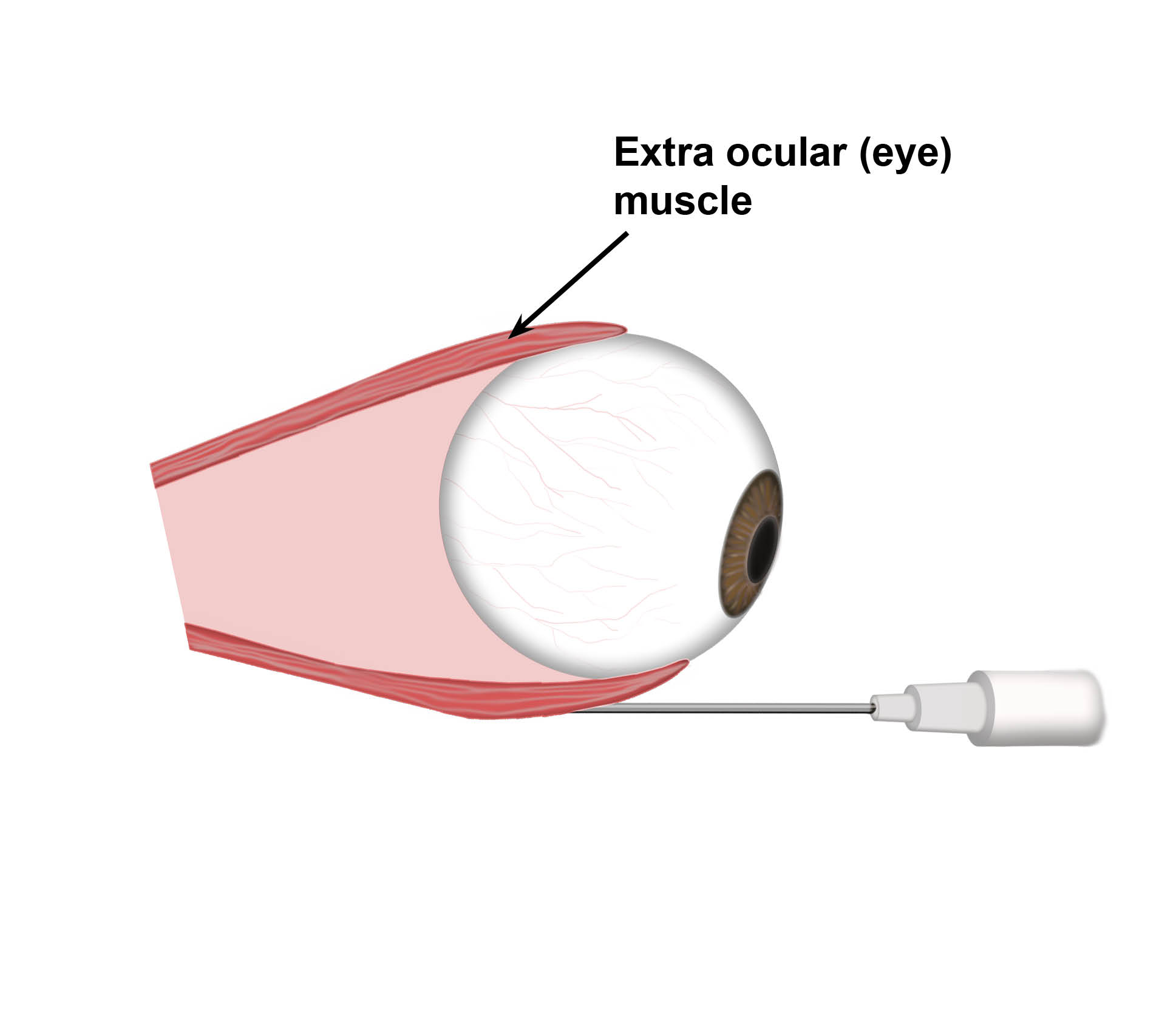Botulinum toxin: a treatment for squint
Information for patients from the Orthoptic Department
This leaflet is not meant to replace the information discussed between you and your doctor, but can act as a starting point for such a discussion or as a useful reminder of the key points.
What is botulinum toxin?
Botulinum toxin is a chemical, which temporarily paralyses the muscle into which it is injected.

How is it used to correct squint?
Botulinum toxin causes a temporary correction of a squint when it is injected into the relevant eye muscle.
In an audit of East Kent Hospitals' patients, this was an effective treatment for reducing the amount of squint in nine out of every 10 cases.
How long does the paralysis last?
The injection takes one to four days to take effect and the paralysis can last for weeks or occasionally
months. It then gradually wears off completely.
The effect of the injection usually lasts for three to four months but each patient is different.
When can the injection be given?
Before your squint surgery to assess any risk of double vision following surgery.
As an alternative to squint surgery if a patient is unfit for general anaesthesia, or in small squints where there is a risk of over correction.
As an addition to squint surgery.
To help with double vision and recovery in patients with eye muscle palsies.
Where is the procedure carried out?
The treatment is carried out as an outpatient in the monthly Eye Clinic at Kent and Canterbury Hospital (K&C).
What happens when I arrive at the hospital?
You will report to the Eye Clinic at K&C for your first orthoptic examination. You will discuss the procedure with your consultant and sign the consent form.
If you have any questions or concerns, please ask them at this appointment.
What happens during my procedure?
Before your procedure local anaesthetic drops are used to numb your eye.
You will need to lie still on a couch for approximately 10 minutes during the procedure. Electrode wires are placed on your forehead and connected to an amplifier and loudspeaker. This allows the exact site of the injection to be carefully monitored by recording electrical activity of the muscle, which can be heard during the injection.
How long will I have to stay in hospital?
Usually you will be in the department for one to two hours if you are having an injection.
Are there any risks to having the treatment?
This treatment is extremely safe in treating squint. In particular, there is no risk of developing botulism.
This procedure involves a needle being inserted near to your eye, so there is a very small risk of perforating the eye with the needle (estimated at one in 650 injections, at most) which could lead to a retinal detachment. If this happens you will need further treatment.
Will I have to wear a patch after my injection?
No, not if you normally wear glasses. But care needs to be taken not to scratch or rub your eye as the local anaesthetic drops take two to three hours to wear off. If you do not wear prescription glasses, we advise you to bring a pair of sunglasses with you to your appointment, or you may need to wear an eye shield.
Will I be able to drive home?
You should not drive home after your procedure. You should make arrangements for somebody to pick you up, or accompany you in the car for your drive home. We also advise you to wait a while in the department after your injection before going home.
How will my eye feel after the injection?
After your injection you may have one or more of the following side effects. These are all temporary and will get better by themselves.
Some patients have an ache in their eye for a while after their injection. If it is no better after one hour, take whatever medication you would normally take for a headache, for example paracetamol.
The direction of your squint may temporarily reverse, and then your eye will gradually straighten as the effect wears off.
Temporary double vision; covering one eye can stop this. If this is significant and bothers you, you should not drive.
Temporary drooping of the eyelid on the side of the injection. This usually settles after a few weeks.
Slight bruising of the surface of the eye.
Will I need a follow-up appointment?
The total effect of the injection usually happens four to five days after your procedure, so you will usually have a follow-up orthoptic appointment one week after your injection.
Will I need further injections?
If the injection does not work it can be repeated the following month. If the injection works well for you it may form part of long-term treatment and can be repeated at intervals.
Is there anything I should do once I return home?
We ask you to remain upright for as long as possible after your injection, preferably into the late evening on the day of your injection, in order to avoid the toxin leaking into the surrounding muscles.
Further information
For more information visit the Squint Clinic, or contact the Orthoptic Department on telephone 01227 868615.
Please note:
If you have any reason to believe you are pregnant let us know.
If you have any reason to believe you might be a carrier of hepatitis or the HIV virus, please make sure that you tell the doctor who sees you in the Eye Clinic. The information is confidential, but it is essential that your doctor is told.